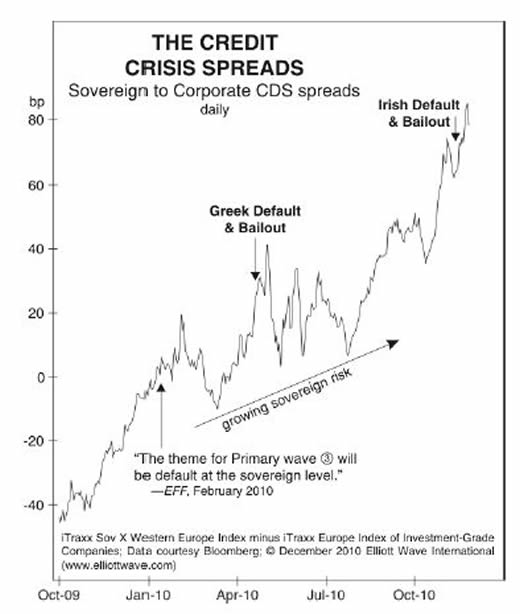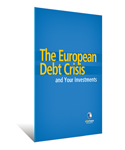The European Debt Crisis and Your Investments
Stock-Markets / Eurozone Debt Crisis Jan 10, 2012 - 12:54 PM GMTBy: EWI
 About the PublisIn 1999, 11 European countries surrendered their currencies for the euro and a shared monetary authority. Barely a decade later, the once-celebrated EU is in the midst of a credit crisis and its currency is facing collapse.
About the PublisIn 1999, 11 European countries surrendered their currencies for the euro and a shared monetary authority. Barely a decade later, the once-celebrated EU is in the midst of a credit crisis and its currency is facing collapse.
Elliott Wave International's analysts have been anticipating and tracking the credit contagion across the European nations for the past two years. EWI subscribers were first alerted to the still-developing European debt crisis back in December 2009.
The following is excerpted from a December 2010 report from The European Debt Crisis, a new report from EWI. This free report provides important analysis from February 2010 through today that helps you understand what the European economic crisis can mean for your investments. Plus, you'll get a unique perspective on what's ahead. Find out how to access this free report below.
The Credit Crisis Spreads -- December 2010 The credit crisis is escalating as expected. Back in January 2010, when ratings agency Moody's bestowed "investment grade" status on a widely followed index of sovereign bonds, The European Financial Forecast argued that a renewed Primary-degree decline would in fact aim the credit crisis directly at this critical new realm. Our case for the looming sovereign debt debacle rested primarily on two pieces of evidence: (1) Primary wave 3 (circled) had begun in Europe's peripheral markets, and (2) premiums for credit-default swaps on European sovereigns (think of an insurance policy against a national default) were already signaling the next phase of the crisis by surpassing their 2008-09 price extremes. The February 2010 issue of EFF published a chart showing rising Greek, Spanish and Italian swaps and offered this description of how Europe's credit crunch would escalate: "The theme during Primary wave 1 (circled) was default at the individual, corporate and quasi-government level. The theme for Primary wave 3 (circled) will be default at the sovereign level."
Today, the credit crunch is clearly angling itself away from mere corporations and toward whole countries. On November 15, Bloomberg announced the escalation with this headline:
Companies Safer Than Sovereigns as Crisis Cracks 'Old Order' -- Bloomberg, November 15, 2010
London credit strategist Greg Venizelos tells Bloomberg that the "old order" was the one where investors believed large sovereign nations to be better credit risks than corporate borrowers. However, debt is being repriced, he says, and today "corporates are now better credit quality than sovereigns in the periphery." Indeed, swaps on Italian government bonds are more expensive than 75% of the Italian companies contained in the iTraxx Europe Index of European corporations. In Spain, traders deem Spanish sovereign debt to be riskier than all six Spanish companies in the index. Even in the supposedly safe core European country of France, 5-year swaps tied to French government bonds climbed to an all-time high of 105 basis points in November. At that level, more than half of the 25 French companies in the iTraxx index trade tighter than the French sovereign, according to Bloomberg.
The chart above shows another way to view the escalation of the credit crisis. By plotting the difference, or "spread," between swaps on European corporations versus those on European sovereigns, the rising line shows derivative traders' increasing fear over sovereign default relative to corporate borrowers. So, yes, the old order of safer sovereigns is over. But notice, too, that the debt crisis began escalating when the continent's peripheral markets started topping way back in October 2009. The billion-euro question is, "Who is next?" The media is clearly focusing on Portugal, as 5-year credit default swaps tied to Portuguese bonds are setting all-time records. But charts show that so too are swaps tied to Spanish and Italian bonds. Five-year swaps on Belgian debt also reached an all-time high last month. Either one of these countries could be next. Maybe they'll all go down together, but in the larger scheme of things, it doesn't matter. The most important thing to observe is that even core European countries like France and Germany exhibit spiking default insurance premiums, too. These countries are the largest contributors to the �440 billion Facility, the same one that backstops the rest of Europe.
The June 2010 European Financial Forecast said unequivocally that before the storm is over, "at least one, but more likely several, G8 nations will capsize." We stand by our forecast.
The European Debt Crisis is affecting investments across the globe. Gain a valuable perspective on the European debt crisis and get ahead of what is yet to come in this FREE resource from Elliott Wave International. Read Your Free Report Now: The European Debt Crisis and Your Investments. |
This article was syndicated by Elliott Wave International and was originally published under the headline The European Debt Crisis and Your Investments. EWI is the world's largest market forecasting firm. Its staff of full-time analysts led by Chartered Market Technician Robert Prechter provides 24-hour-a-day market analysis to institutional and private investors around the world.
her, Elliott Wave International Founded in 1979 by Robert R. Prechter Jr., Elliott Wave International (EWI) is the world's largest market forecasting firm. Its staff of full-time analysts provides 24-hour-a-day market analysis to institutional and private around the world.
© 2005-2022 http://www.MarketOracle.co.uk - The Market Oracle is a FREE Daily Financial Markets Analysis & Forecasting online publication.





